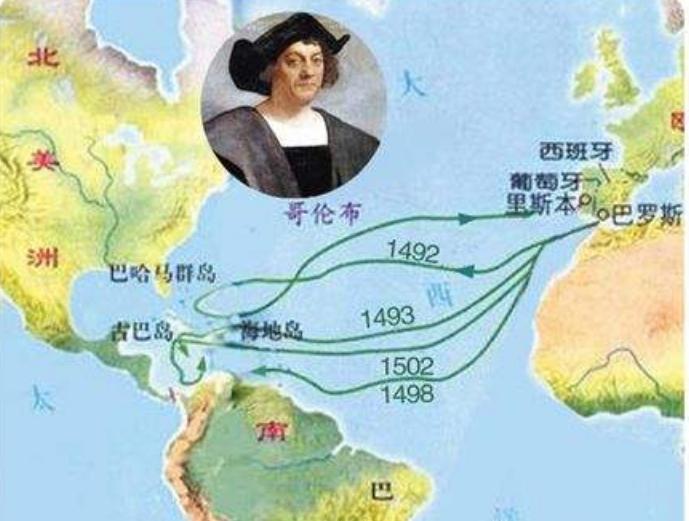People who know modern history have a question: Why do the great powers fight each other? Wouldn't it be nice for everyone to engage in trade together and replace war with commercial competition?
Historically, the French and the Germans were close in blood, but they fought each other inextricably; after World War II, the United States and the Soviet Union risked nuclear war to engage in a "cold war" and so on.
There are, of course, many explanations for these issues. Recently, I read the biography of Columbus and saw the answer to this question from another angle.

One. The International Order of the Columbus Era.
Where there are people, there are rivers and lakes, and there is also an international order between countries. In East Asia, there was a tributary system dominated by China, while the international order in West Asia and North Africa was dominated by the Ottoman Empire.
Today's international order, however, has evolved from an order between European nations.
Columbus was born in Genoa, Italy, in 1451. At that time, Italy was just a geographical term, and there were many independent small countries on the Italian peninsula. Genoa and Venice were among the wealthiest small commercial countries.
The situation in Europe at that time was as follows: the Mediterranean coast was the center of Trade in Europe, and the Ottoman Turkish Empire monopolized trade between the East and the West.
The Turks only traded with Genoa and Venice. Merchants in Genoa and Venice then sold Asian goods from the Turks to other European countries.
In this way, Genoa and Venice, with a population of only a few tens of thousands, became the European "general agents" of the Ottoman Empire, and they were very rich. Other European countries could only envy and hate this, but there was nothing they could do, because they could not defeat the Ottoman Empire.
At that time, Marco Polo's Travels were widely circulated in Europe, and some European countries were eager to bypass the Ottoman Empire and use the sea route to trade directly with the Orientals.
Second, Columbus's growth.
Before Columbus was born, the Portuguese had begun to explore the west coast of Africa, trying to find a sea route to the East.
Born and raised in Genoa, where commerce was prosperous and navigation flourished, Columbus was fascinated by Marco Polo's deeds from an early age, and his ideal was naturally to be a captain and be able to travel to the East.
Columbus had two younger brothers and one younger sister. His father had a textile workshop and the family was not wealthy. But his father supported his dream of sailing and sent him to school to learn about sailing. Until the family could not afford it, 14-year-old Columbus dropped out of school to become an apprentice on the ship.
Third, the captain, the naval officer, and the pirate are one.
The old captain of Columbus's ship was called Colombo, a distant relative of Columbus, so he was very concerned about Columbus, often teaching Columbus the knowledge and skills of navigation.
Colombo was a merchant ship captain in Genoa, a naval officer, and a pirate leader for other European countries.
During the voyage, he encountered ships from other European countries, and if there was a chance to attack, he would direct the soldiers on board to plunder.
Genoa's greatest enemy was none other than Venice, which was also italian. If you don't rob other countries, they still rob you, and you suffer losses.
At that time, Genoa and Venice were both independent countries and wealthy counterparts, and robbing each other was a must.
At that time, mutual robbery between European countries was a normal phenomenon. Similar to the fight between the seven heroes of the Warring States.
It is also worth saying that Marco Polo (1254-1324) was a Venetian. After traveling to the East and returning to Venice, he took part in the war with the Genoese. Marco Polo's Travels were written by him in his prison in Genoa.
Europe at that time was such an international order. Merchant fleets must be armed and escorted by naval vessels to protect their own fleets while robbing the fleets of other countries.
Fourth, the trip to the Americas.
After Columbus left the old captain, he felt that his opportunities in Genoa were limited, so he went abroad to find work, and finally began the trip to the Americas with the financial support of Queen Isabella of Spain.
In 1492, Columbus discovered the Americas and brought back from the Americas more than a dozen Indians as slaves to Queen Isabella.
Fifth, the evolution of the international order.
The Mediterranean coast was once the economic center of Europe during the Medieval Period.
After the opening of the new route, Portugal and Spain easily defeated Venice and Genoa to become the economic centers of Europe. Spain also ruled the Italian peninsula for a time.
Subsequently, the British gained massive wealth by robbing Spanish ships transporting gold and silver, and gradually rose to become the hegemon of the seas, replacing Spain as the "Empire of the Sun Never Sets".
After that, France, Germany, and the United States grew into world powers and had a major impact on the international order.
The rise of each great power is accompanied by war, which poses a serious challenge to the former hegemon and even replaces the other with force. This is a tradition that has been formed since the time of Marco Polo and Columbus.
Under the Western order, you do not rob others, others still rob you, your own interests need to be fought for by yourself, how much strength you have to fight for as much interests as you want, pity for the enemy is cruelty to yourself, the struggle will never stop.
This is the historical logic of the centuries-old international struggle in modern and contemporary history. This is also the reason why the Qing Dynasty tolerated everywhere and could not exchange peace.